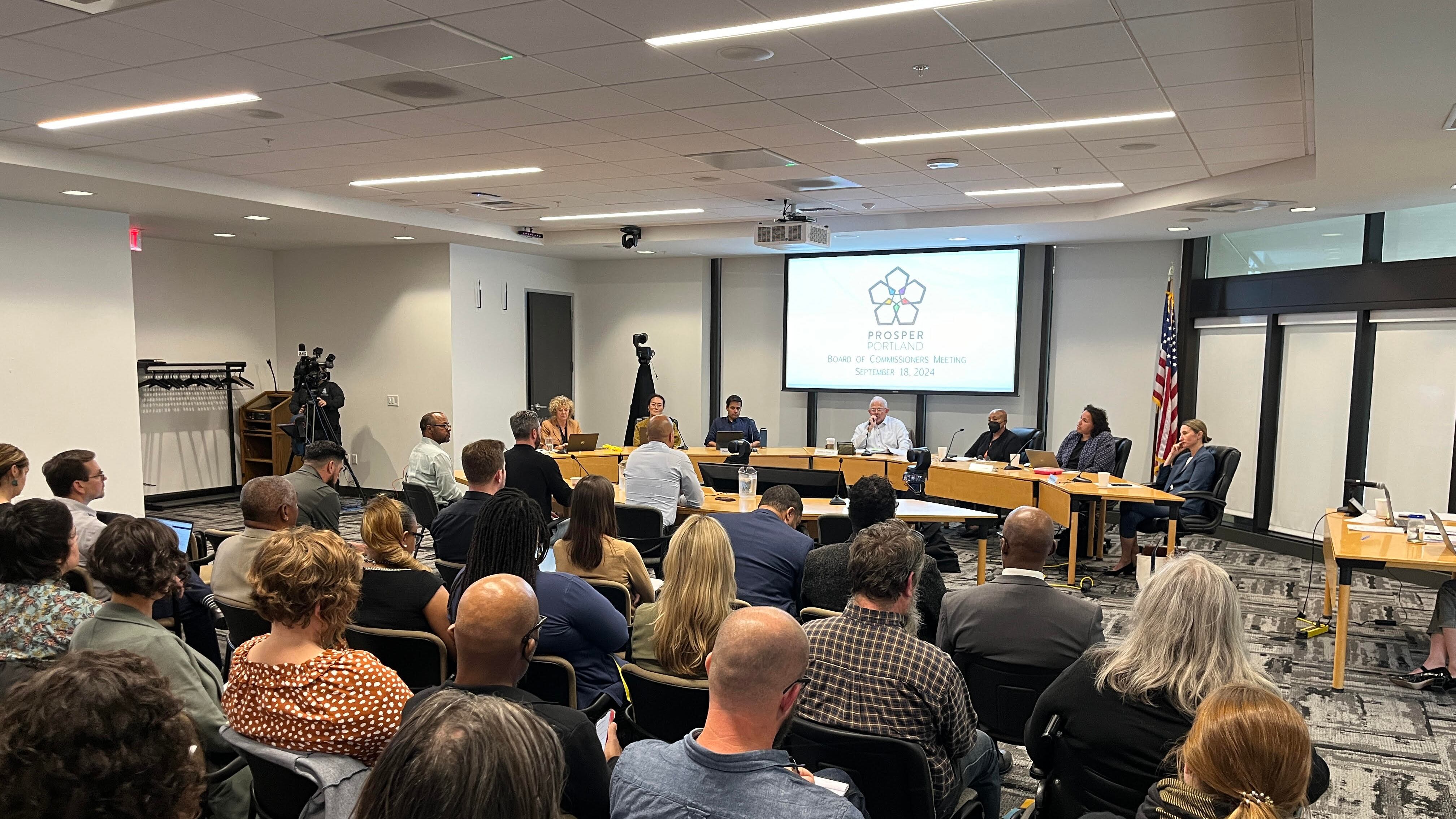The board of commissioners at Prosper Portland, the city’s economic development agency, voted today to sell a 0.8-acre plot of land at the east end of the Hawthorne Bridge to two local development firms that are working with Live Nation Entertainment to build a $50 million music venue there.
Beam Construction & Management LLC and Colas Development Group LLC may now buy the property, which was appraised at $2.4 million on Sept. 9. The lot is one of three in the area that Prosper bought from the Oregon Department of Transportation in 2017 using deferred tax revenue.
The price could drop depending on industrial pollution at the site. Prosper said it will reimburse Beam and Colas up to $749,000 for environmental cleanup if necessary.
The vote was 4-0 with one abstention.

The new venue has drawn opposition from local musicians and venue owners because Live Nation, the largest entertainment company in the world, has a history of anticompetitive behavior in the entertainment business, according to a lawsuit filed by the U.S. Department of Justice in May and joined by 40 state attorneys general, including Oregon’s.
“The question today is, ‘Does the construction and operation of a Live Nation venue in the city of Portland demonstrate a clear public benefit?’” musician Katelyn Convery testified to the Prosper board. “The answer is simply no. Their responsibility is to shareholders states and oceans away.”
Until last week, Prosper had planned to lease the land to Beam and Colas. On Friday, opponents learned that Prosper intended to sell the land instead, a move that drew further scorn from opponents.
“Prosper Portland was to receive at least $130,000 per year on this land in lease payments for 100 years,” MusicPortland volunteer and City Council candidate Jamie Dunphy told the Prosper board. “That is at least $13 million over the life of this property, as opposed to the roughly $2 million that is being considered today.”
A Prosper staffer said the agency switched to a sale because members of the community gathered at a MusicPortland event had decried the lease as a public subsidy.
In documents describing the project, Prosper said it will foster “vibrant central city and commercial districts by retaining and increasing commercial activity. Selling the property will raise cash that can be used for grants and loans to small businesses on the Central Eastside and to support events citywide.” The sale boosts equity because Colas is a Black-owned firm, Prosper said.
“The central city and the Central Eastside need wins,” Jonathan Malsin, owner of Beam Development, told the Prosper board.
Opponents said Prosper is doing business with a firm that aims to monopolize live entertainment in markets where it operates. Portland is the last large city without a Live Nation venue.
Live Nation has “a long track record of violating consent decrees, violating lease agreements, and using unfair and illegal business practices,” MusicPortland, a nonprofit group representing musicians, said in a statement. “This company has repeatedly demonstrated that they are bad actors and are not operating in good faith. They should not benefit from the City’s economic development programs.”
Live Nation, based in Beverly Hills, California, abuses its multiple roles as a venue owner, promoter and ticket seller to keep rivals out of regional markets, the DOJ said in its complaint. Live Nation controls 338 music venues worldwide, including the Hayden Homes Amphitheater in Bend, the Gorge Amphitheatre in George, Washington, and Lumen Field in Seattle. It manages 410 bands and musicians, from U2 to Pitbull. In 2010 it bought Ticketmaster, giving it end-to-end control of the live music business.
In order to complete the Ticketmaster purchase, Live Nation had to guarantee to the DOJ that it wouldn’t withhold Live Nation tours from independent venues that didn’t sell tickets through Ticketmaster. Three years later, Live Nation moved a Matchbox Twenty show from the popular Gwinnett Center in Atlanta because it had stopped using Ticketmaster, according to The New York Times.
Andrew Colas, president of Colas Development, said he and Malsin had gotten guarantees from Live Nation that will curb any anticompetitive behavior, including opening the venue to other promoters and eschewing “radius clauses,” which prohibit musicians from playing at nearby venues within a certain amount of time to avoid cannibalizing ticket sales.
“We had to ask them for things that they don’t do for other cities,” Colas said. “It wasn’t easy.”
Tomorrow the City Council will consider an appeal by MusicPortland of conditional use permits for the 62,000-square-foot building granted by the city last month. MusicPortland says the city should have denied the permits because of potential harm to the environment, a lack of parking, proximity to unprotected train tracks, and “the lack of a public benefit.”
